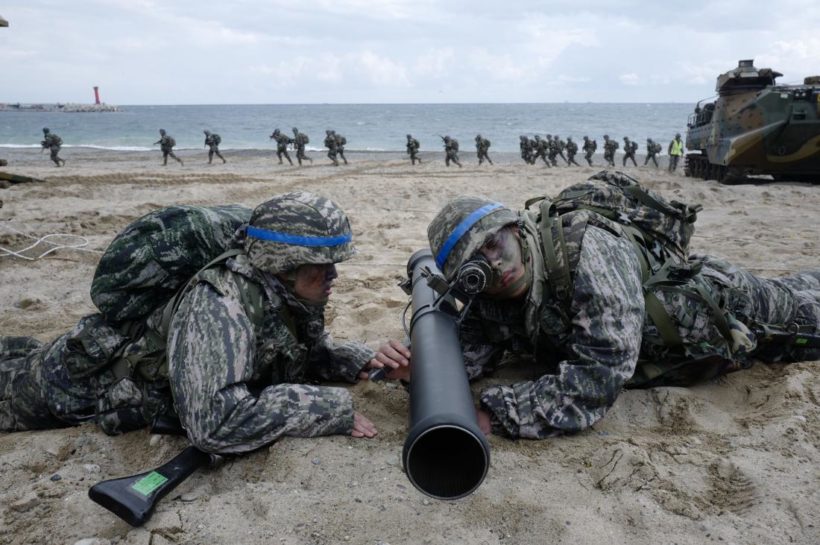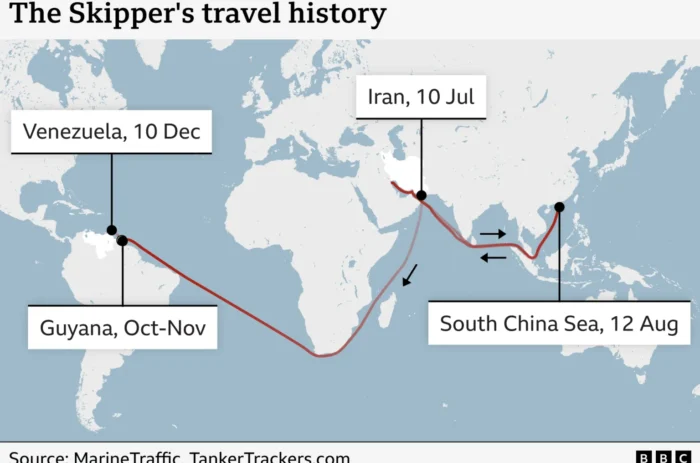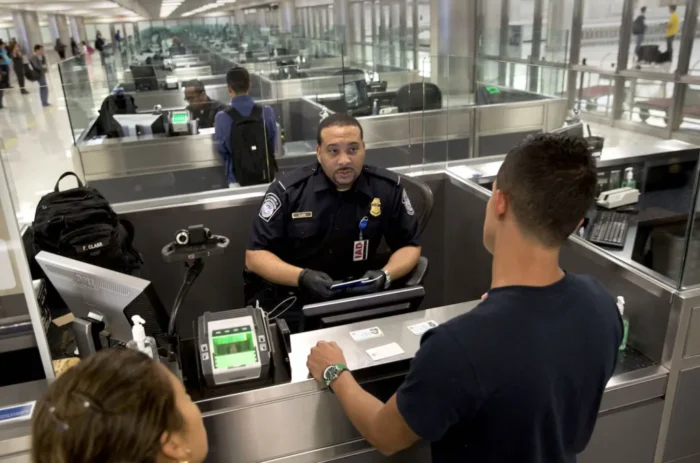
File photo of annual Amphibious Operations (AMPHOPS) during the annual Foal Eagle exercises against a possible attack from North Korea, in Pohang, 360 km southeast of Seoul, South Korea, on April 2, 2017. (File Photo by Jeon Heon-kyun/EPA)
redo Jump to...
print Print...
(by Jennie Oh, UPI) SEOUL — South Korea and the United States began their delayed joint military training on Sunday, mobilizing more than 300,000 troops.
Seoul’s defense ministry said the springtime Foal Eagle kicked off with 11,500 U.S. troops and 300,000 South Korean soldiers taking part in the field training exercise, one of the largest military drills conducted annually in the world, SBS reported.
The exercise, which usually takes place late February or early March, was postponed this year to avoid an overlap with the Pyeongchang Winter Olympic and Paralympic Games held from February to March in South Korea.
President Moon Jae-in had requested the delay, in hopes of defusing tensions with North Korea, which has long seen the exercises as a rehearsal for war and used them as a pretext for provocations.
With cross-border relations appearing to improve as the two Koreas head to summit talks slated for later this month, observers have said the South Korea-U.S. drills have been notably scaled down this year.
The two-month long Foal Eagle exercise has been reduced to a four-week run with no major U.S. strategic assets such as supercarriers or nuclear submarines expected to be deployed to the peninsula, Yonhap reported.
However, [U.S. and South Korean] authorities have denied the drill will be low-key compared to previous years, saying there is no change in the number of troops, the program or the intensity of the exercise.
Beginning April 23, the two allies will also begin the computer simulated Key Resolve games for two weeks, involving 12,200 U.S. troops and 10,000 South Korean soldiers.
Published at United Presss International (UPI) on April 1.
Questions
1. For SOUTH KOREA, give the following information:
- capital
- location/the countries that share its borders
- the religious breakdown of the population
- the type of government
- the chief of state (and head of government if different) If monarch or dictator, since what date has he/she ruled? – include name of heir apparent for monarch
- the population
Find the answers at the CIA World FactBook website. For each country, answers can be found under the “Geography” “People” and “Government” headings.
NOTE: Before answering the following questions, read the info under “Background” below.
2. For SOUTH KOREA:
a) list the who, what, where and when of the news item
b) What is significant about the U.S. – South Korea military exercises?
c) Why was the start of the exercises delayed this year? Be specific.
d) The AP reported: “The war games being conducted this week by the United States and South Korean militaries have an unusually low-key approach.” How have U.S. and South Korean authorities responded to this assertion?
Background
- Seoul and Washington both publicly say the military training this time will be similar to previous years. But South Korean defense officials say there are no immediate plans to bring in US aircraft carriers, powerful bombers, or other strategic assets that have been deployed in and around the Korean Peninsula during past drills. …
- The two sets of military drills, one field-training and the other computer-simulated, typically run for two months, but this year’s exercises are scheduled to last for just one month. The allies also have no immediate plans to publicize the training, according to Seoul’s Defense Ministry.
- North Korea’s state media haven’t said anything about the drills since their start. Even if there is some criticism later, it will probably be milder than past warlike rhetoric, which often saw daily threats to launch nuclear strikes on Seoul and Washington or void the armistice that ended the 1950-53 Korean War.
- Kim told visiting South Korean officials last month that he ‘‘understands’’ the drills will take place and expressed hope that they’ll be modified once the situation on the peninsula stabilizes, according to the South Korean government.
- While diplomacy holds, it’s also unlikely that North Korea will test any weapons, as it has during past drills. Such tests could endanger the North’s outreach and crush the current rapprochement. …
- Kim’s planned meeting with South Korean President Moon Jae-in on April 27 will occur around the time the US-South Korean drills end.
- The meeting will be the third-ever inter-Korean summit since the Koreas’ 1945 division. It is crucial because it may offer insight about what nuclear disarmament steps Kim could offer and what concessions the allies might be willing to provide.
- It is unlikely that Kim will completely give up his nuclear ambitions. (from an April 2 Associated Press report at bostonglobe .com)
Foal Eagle: (from wikipedia)
- Foal Eagle is a combined Field Training Exercise (FTX) conducted annually by the Republic of Korea Armed Forces and the U.S. Armed Forces under the auspices of the Combined Forces Command.
- It is one of the largest military exercises conducted annually in the world.
- While defensive in nature and conducted primarily as a rear area security and stability training exercise, Foal Eagle has been a source of friction with the government of Democratic People’s Republic of Korea (DPRK)…
- The primary purpose of Foal Eagle is to demonstrate South Korean-U.S. military resolve to deter war on the Korean peninsula and to improve the combined and joint operational posture of those forces.
- Foal Eagle is a purely defensive exercise which tests the capability of South Korea to defend itself, assisted by the U.S. Armed Forces, and it is also primarily a rear area security and stability operations…
- The UN Command informs the North Korean People’s Army that South Korea and the U.S. will be conducting the exercise. The UN Command also reassured the Korean People’s Army at general officer-level talks that these exercises, conducted annually in or around March, are purely defensive in nature and have no connection to ongoing or current events.
- The Neutral Nations Supervisory Commission monitors the exercise to ensure that there are no violations of the Korean Armistice Agreement.
- Since 2001, Foal Eagle combined with the annual American-South Korean Reception, Staging, Onward movement, and Integration (RSOI) combined exercises, with RSOI being renamed Key Resolve in 2008. (Read the wikipedia entry for Key Resolve)
Daily “Answers” emails are provided for Daily News Articles, Tuesday’s World Events and Friday’s News Quiz.



